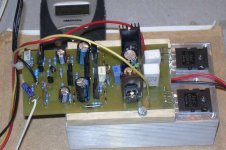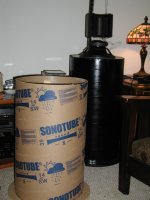jkeny said:What does that mean, Stinius? If you are trying to start another Class A/ not Class A debate then forget it!!
Edit: OK it was pointed out to me that you were just pointing to the origination of the Class A confusion - apologies if I was blunt but I'm sick of hearing this Class A S**T
No problem jkeny
It was just an answer to this post by Steve.
http://www.diyaudio.com/forums/showthread.php?postid=1753459#post1753459
Cheers
Stinius
John,
The point about the Class A debate on this thread is
- where does it get you? Yes or no - what's the difference
- it drowns out the real info on the thread which is about learning how the Krill OPS works & possibly improving/adapting it
- Steve has answered this before a number of times
So go ahead and discuss something which has been discussed an unreasonable number of times before while avoiding the chance to learn something new
Edit: Are you not happy posting about Class A on the other thread?
The point about the Class A debate on this thread is
- where does it get you? Yes or no - what's the difference
- it drowns out the real info on the thread which is about learning how the Krill OPS works & possibly improving/adapting it
- Steve has answered this before a number of times
So go ahead and discuss something which has been discussed an unreasonable number of times before while avoiding the chance to learn something new
Edit: Are you not happy posting about Class A on the other thread?
stinius said:
You call that making a big deal? I clearly stated many people would not consider the design class A as class A has come to mean, to many people, runs hot. To some people, having the output transistors never turn off can be considered class A. You are welcome to your own opinion. I have seen and heard many through the years.
jkeny said:
So go ahead and discuss something which has been discussed an unreasonable number of times before while avoiding the chance to learn something new
Edit: Are you not happy posting about Class A on the other thread?
Hi,
I have little time for being told to stop talking about something, even by the mods. If the discussion turns a certain way, I feel it should be followed. We are free thinkers, are we not? Not robots or (most of us) children.
If I don't like the turn of conversation in a situation, I leave it.
Steve Dunlap said:...as class A has come to mean, to many people, runs hot. To some people, having the output transistors never turn off can be considered class A. You are welcome to your own opinion. I have seen and heard many through the years.
How about the outputs running hot, never turning off because they are biased to the point where the current demand of the load will not exceed that which is already being handled by the device - ie: current doesn't fluctuate. That, to me, is class A.
I know it will amuse you no end - the first amplifier I ever designed
was basically the same thing.
See the thread "My First Amp" in the Pass Labs forum.
😎
was basically the same thing.
See the thread "My First Amp" in the Pass Labs forum.
😎
As I said - Are you not happy posting about Class A on the Blowtorch thread? Why bring it over here? Is this all you're willing to talk about or learn?
Nelson Pass said:I know it will amuse you no end - the first amplifier I ever designed
was basically the same thing.
See the thread "My First Amp" in the Pass Labs forum.
😎
Search Result = "Your search has returned too many results. Please refine your search and try again." How 'bout a better clue Papa?

jkeny said:As I said - Are you not happy posting about Class A on the Blowtorch thread? Why bring it over here? Is this all you're willing to talk about or learn?
How many posts do you want to waste interrogating me? 🙂
I didn't bring anything here.
jkeny said:
Many Thanks

And the loop goes round and round.. the Susuma tanaka paper
credits nelson pass's biasing scheme at the end...Ha HA
We can't get away with anything around here..too many patent
holders..😀
OS
credits nelson pass's biasing scheme at the end...Ha HA
We can't get away with anything around here..too many patent
holders..😀
OS
Nelson Pass said:I know it will amuse you no end - the first amplifier I ever designed
was basically the same thing.
See the thread "My First Amp" in the Pass Labs forum.
😎
Hi Nelson,
Are you referring to my design? What I am doing is quite different from the schematic in your thread.
Nelson Pass said:I know it will amuse you no end - the first amplifier I ever designed
was basically the same thing.
See the thread "My First Amp" in the Pass Labs forum.
😎
I wish you had showed me that one when we were working together fixing stereo's for a living. I might have had a clue about what you were trying to explain! Now - some 30 plus years later - the lights have come on! I guess some of us are slower that others!!

heinz said:R9 is OK in my schematic ... a picture of my first build is attached ... i hope ;-)
That's the way I like to see DIY being done!!! 😀 😀 😀 😀
But I am also known for knocking together one of the ugliest speakers ever to see the light of day!!
 (Sounds great tho)
(Sounds great tho)Wires and parts exposed in all of their prototype glory!! Have you had a chance to put it through some testing? How are your impressions - if I may ask.
Attachments
jkeny said:
Let me count the ways in which that amplifier is scary.
Nelson has sure learned a lot since then 🙂.
Anyway, it is just a non-switching amplifier output stage in that the output transistors never completely turn off. It has virtually nothing to do with class A.
Only marketeers refer to this sort of thing as class A.
Cheers,
Bob
Only marketeers refer to this sort of thing as class A.
I am getting accused of that as well , some insist that all
these "non- switching amps" are BS and they do switch
through cross conduction.
The pass patent , tanaka , technics , even the new "dartzeel"
amp exhibit the same results. The krill (I can mention it here)
just does it the best with the lowest parts count.
SO , is this all an illusion or have some been chasing ghosts since
the 70's.

OS
- Status
- Not open for further replies.
- Home
- Amplifiers
- Solid State
- Krill - The little amp that might...

